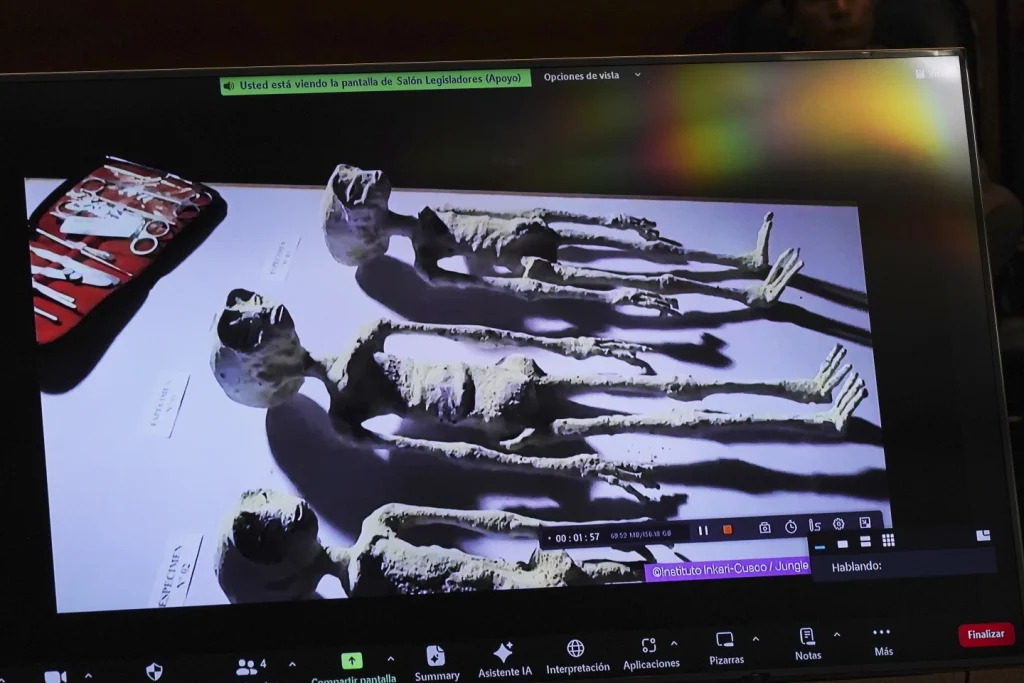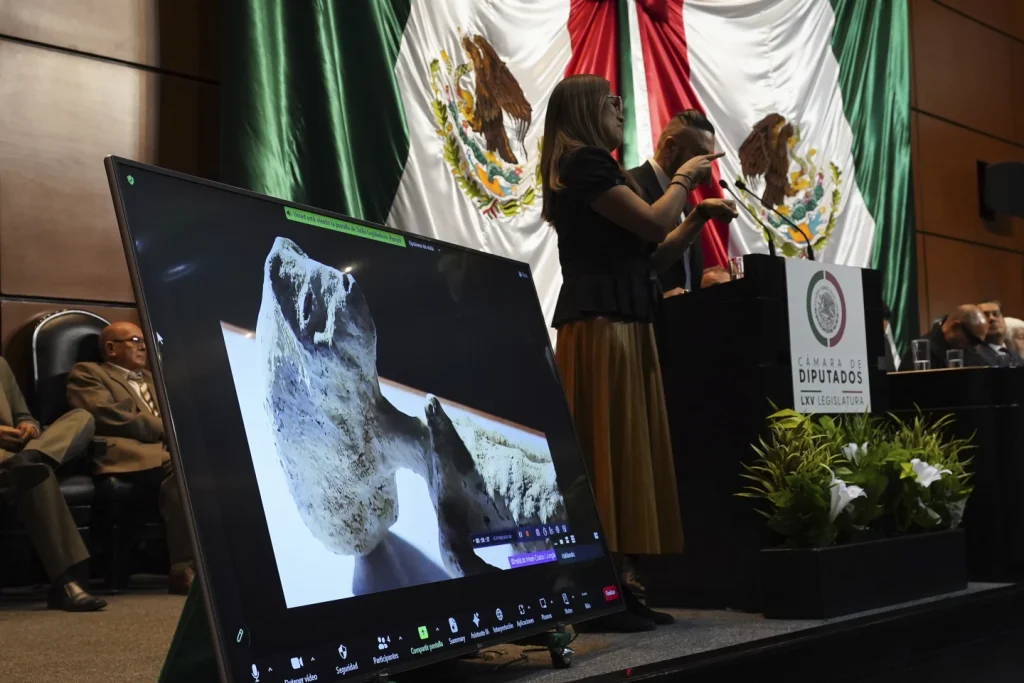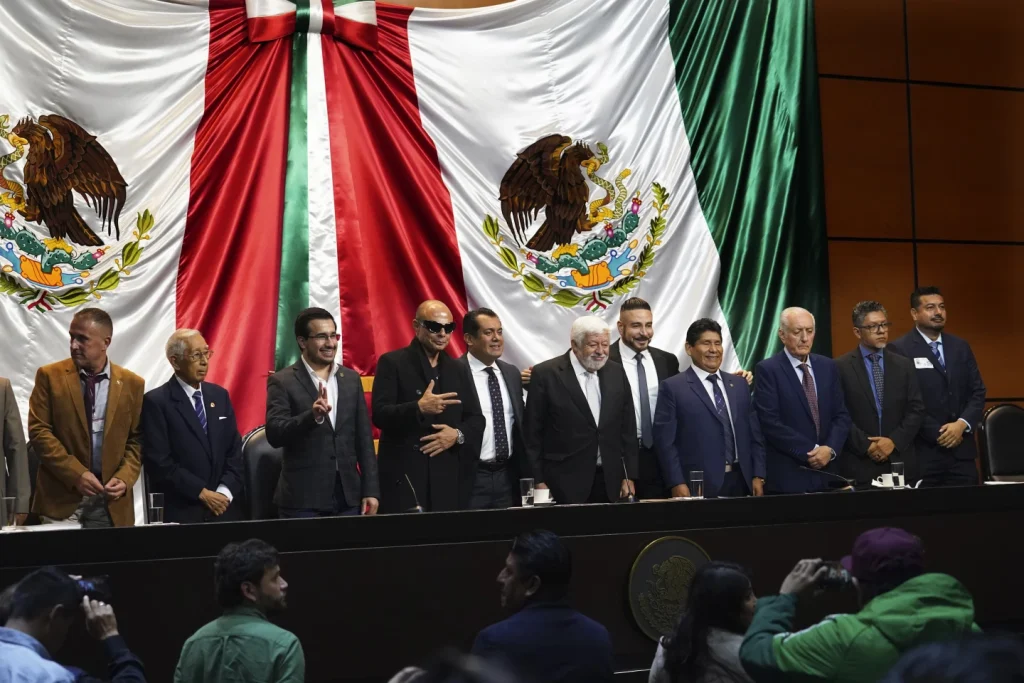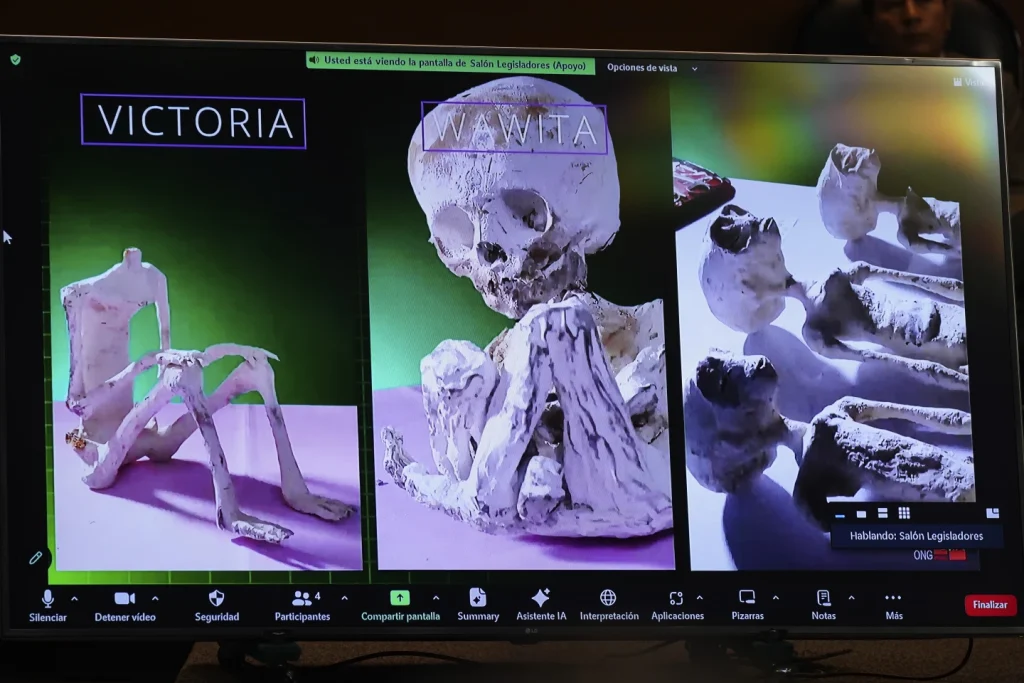It is indeed disconcerting to observe the lower chamber of Mexico’s congress allocating a significant amount of time and attention to a spectacle that seems to lack substantial scientific or empirical evidence.
The decision to dedicate over three hours to the assertions made by journalist José Jaime Maussan and his group of Peruvian doctors regarding the existence of “non-human beings” in Peru raises concerns about the prioritization of unsubstantiated claims over more pressing and evidence-based matters.
In the wake of the recent devastation caused by Category 5 Hurricane Otis in Acapulco, a city with a population of nearly 1 million people, it is imperative for legislative bodies to focus on addressing the urgent needs of affected communities, implementing measures for disaster relief, and formulating strategies for long-term recovery and resilience.
The allocation of such a considerable amount of time to a topic that lacks credibility and scientific rigor raises questions about the priorities and responsibilities of the Chamber of Deputies.
While acknowledging the importance of fostering open dialogue and considering diverse perspectives, it is crucial for legislative bodies to exercise discretion and allocate their time and resources judiciously, particularly in the aftermath of natural disasters and during times of pressing societal challenges.
The decision to provide a platform for unverified claims, especially in a formal legislative setting, may undermine the credibility and integrity of the institution and detract from its ability to address substantive issues that demand urgent attention and action.
As representatives of the public, the members of the Chamber of Deputies have a responsibility to uphold the principles of evidence-based decision-making, critical thinking, and accountability to the citizens they serve.

It is essential for legislative proceedings to be guided by a commitment to fostering informed discussions, promoting transparency, and prioritizing the well-being and interests of the populace.
Therefore, the recent allocation of extensive time and attention to unsubstantiated claims warrants reflection on the part of the legislative body and underscores the importance of maintaining a focus on matters of genuine significance and impact.
In conclusion, while acknowledging the value of diverse perspectives and open dialogue, it is crucial for the Chamber of Deputies to exercise prudence and discernment in determining the allocation of its time and resources, particularly in addressing pressing societal challenges and responding to critical events such as natural disasters.
Upholding the principles of evidence-based decision-making, accountability, and transparency is fundamental to fulfilling the duties and responsibilities entrusted to the legislative body by the public.
The presentation of the supposed mummies found in Peru by Maussan and some Mexican lawmakers in September sparked international ridicule and skepticism.
The claim that these mummies were “non-human beings that are not part of our terrestrial evolution” raised eyebrows and led to widespread criticism from the scientific community and the general public.
Many experts and scholars dismissed the claims as unfounded and lacking in credible evidence. The sensationalized nature of the presentation and the lack of rigorous scientific investigation only served to further discredit the claims made by Maussan and his colleagues.
The incident serves as a reminder of the importance of critical thinking and skepticism when faced with extraordinary claims, and highlights the dangers of promoting unverified and sensationalized information.
It also underscores the responsibility of lawmakers and public figures to exercise caution and due diligence when endorsing such controversial and extraordinary claims.
Ultimately, the episode serves as a cautionary tale about the potential consequences of promoting unverified and sensationalized information, and the importance of upholding rigorous scientific standards in the pursuit of knowledge and understanding.
In 2017, Maussan made similar claims in Peru, asserting that he had found evidence of extraterrestrial life in the form of mummified bodies.
However, a report by that country’s prosecutor’s office found that the bodies were actually “recently manufactured dolls, which have been covered with a mixture of paper and synthetic glue to simulate the presence of skin.”
This revelation sparked widespread skepticism and criticism of Maussan’s claims, with many questioning his credibility and the validity of his evidence.
The incident also brought into question the ethics of presenting unverified information as fact, especially in the realm of scientific discovery and exploration.
It serves as a cautionary tale for the importance of thorough investigation and skepticism in the face of extraordinary claims, and highlights the potential consequences of promoting unsubstantiated theories.
The case of Maussan’s alleged discovery in Peru serves as a reminder of the need for critical thinking and rigorous scrutiny in the pursuit of knowledge and truth.
The report’s assertion that the figures were almost certainly human-made, and not the remains of ancestral aliens as previously claimed, has sparked widespread debate and speculation.
The implications of this statement are significant, as it challenges the long-held beliefs and narratives surrounding the origin and nature of these enigmatic bodies.
The fact that the bodies were not publicly unveiled at the time further adds to the mystery, leaving open the possibility that they may not be the same as those previously presented to Mexico’s congress.
This revelation has triggered a wave of skepticism and scrutiny, prompting experts and enthusiasts alike to reevaluate their understanding of these ancient artifacts and the stories they tell.

The implications of this report extend beyond the realm of archaeology and history, touching on broader questions of human history, cultural narratives, and the enduring allure of the unknown.
As the debate unfolds, it becomes clear that this revelation has the potential to reshape our understanding of the past and the way we interpret ancient artifacts.
During the presentation on Tuesday, Dr. Daniel Mendoza captivated the audience with his photographs and x-rays of what he claimed to be a “non-human being.”
His findings were met with great intrigue and curiosity, as the implications of discovering a new species would be groundbreaking.
Jaime Maussan, a renowned journalist and ufologist, further added to the excitement by declaring that the creature lacked lungs and ribs, leading to the conclusion that it was indeed a new and unknown species.
The implications of such a discovery are vast, as it could potentially change our understanding of biology and evolution.
The scientific community is eagerly awaiting further research and analysis to determine the validity of these claims, as the discovery of a new species would be a monumental achievement in the field of biology.
The presentation has sparked a great deal of discussion and speculation, and it will be fascinating to see how this discovery unfolds in the coming months.
It is indeed disheartening to witness the lower chamber of Mexico’s congress being engrossed in what can only be described as a spectacle, as depicted in the original text.
The allocation of such a significant amount of time to a controversial character, who purportedly pressed the case for “non-human beings” found in Peru, seems to be a misplacement of priorities, especially in the wake of the recent devastation caused by Category 5 Hurricane Otis in Acapulco.
The juxtaposition of these events raises concerns regarding the allocation of time and resources within the Chamber of Deputies.
The decision to devote more than three hours to listening to journalist José Jaime Maussan and his group of Peruvian doctors, amid the aftermath of a natural disaster that has left a significant impact on the lives of nearly 1 million people in Acapulco, prompts reflection on the focus of the legislative body.
In such a critical period, where the urgent needs of the affected population should be at the forefront of attention and action, the allocation of time to discuss a topic of questionable relevance appears to be a divergence from the pressing issues that demand the attention and efforts of the Chamber of Deputies.
It is heartening to note the sentiment expressed by lawmaker Sergio Gutiérrez Luna, representing the governing party of President Andrés Manuel López Obrador, regarding the welcoming of all ideas and proposals for debate.
The acknowledgment that diverse viewpoints and perspectives should be considered and deliberated upon is an essential aspect of a democratic society.
However, it is imperative to emphasize that the allocation of time and resources within the legislative body should be aligned with the needs and priorities of the populace, especially in the aftermath of a natural disaster.
As such, while the openness to diverse ideas and proposals is commendable, it is crucial for the Chamber of Deputies to exercise prudence and discernment in prioritizing the allocation of time and resources, particularly in the context of pressing issues such as post-disaster recovery and reconstruction efforts.
The responsibility of the legislative body extends to addressing the immediate needs of the affected population and working towards the implementation of measures that contribute to the well-being and resilience of communities impacted by such calamities.

In conclusion, the sentiments expressed by lawmaker Sergio Gutiérrez Luna underscore the importance of fostering a culture of open debate and consideration of diverse perspectives within the legislative framework.
However, it is essential for the Chamber of Deputies to exercise judiciousness in prioritizing the allocation of time and resources, particularly in the aftermath of significant events such as natural disasters, to effectively address the needs and concerns of the populace.
